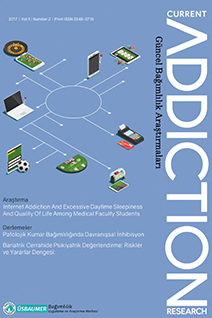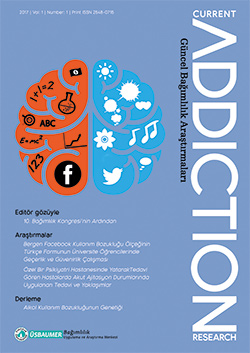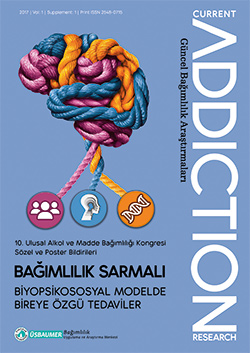Years
2025
2024
2023
2022
2021
2020
2019
2018
2017
Categories
Authors
- ALEJANDRO BORREGO-RUIZ (1)
- Abdullah TÜRKMEN (1)
- Ali Yasin Kafes (1)
- Aslı Zeynep Başabak Bhais (1)
- Aybüke Kaplan (1)
- Birgül CUMURCU Hatice (1)
- Burcu YÜCETÜRK (1)
- Caner ASLAN (1)
- Cemal Onur NOYAN (1)
- Ceyda ŞİŞMAN ÜNLÜ (1)
- DURMUŞ ELİF (1)
- Duygu KILIÇ ÖZTAN (1)
- EMLU HAKAN (1)
- Eda Deligöz (1)
- FİDAN ENİSE KÜBRA (1)
- Gökben Hızlı Sayar (2)
- Gül ERYILMAZ (1)
- Gül Eryılmaz (1)
- Gürler GÜZ (1)
- Gürler Güz (1)
- Hasan Kaya (1)
- Hatice Özyıldız Güz (1)
- Işıl Göğcegöz (1)
- KABA AYŞE (1)
- KABA FATİH (1)
- KARABURUN MERVE (1)
- Mustafa AKAN (1)
- Nesrin Dilbaz (2)
- Rüstem Mustafaoğlu (1)
- Sedef KOÇ BAL (1)
- Selami Ülker (1)
- Sever Yıldırım (1)
- Simge ALEVSAÇANLAR CÜCÜ (2)
- Tijen ŞENGEZER (1)
- Türker Tekin Ergüzel (1)
- Zakirov Fagan (1)
- Çetin Alptekin (1)
- ÖZKAN EZGİ (1)
- Özlem Bolat Kaya (1)
ARTICLES
Review Article
Tijen ŞENGEZER,Caner ASLAN
2021, 5(2), s:35-42
Review Article
Mustafa AKAN,Birgül CUMURCU Hatice
2021, 5(1), s:16-24
Review Article
Simge ALEVSAÇANLAR CÜCÜ
2020, 4(2), s:54-62
Review Article
Rüstem Mustafaoğlu
2019, 3(1), s:5-10
e-Sports become a part of our modern sport as it has entered our agenda in recent years, its popularity has increased rapidly and its mass of followers consists of young generation has reached a huge budget. In this review, the definition of e-Sport, historical development process, place in the world and our country, the spiritual and physical positive and negative effects on the individuals has been mentioned. Finally, it was mentioned about ergonomic changes and practical exercise suggestions to prevent possible musculoskeletal problems in e-Sport players. Scientific studies about e-Sports in Turkey is limited compared to other countries. With this study, it is aimed to eliminate the lack of Turkish resources related to this field which is developing day by day, to share the findings with the related health professionals and to contribute to the literature.
Review Article
Sever Yıldırım,Türker Tekin Ergüzel,Gökben Hızlı Sayar
2019, 3(1), s:25-30
Nowadays most of the young generation use internet intensively. These individuals are constantly online thanks to their smart phones. Since internet has a usage area that is so wide and smart phones give their users very easy access to it, many people feel desire to use smart phones. Smart phones come in many different price ranges and they are accessible for every consumer type. Many advertisements are being made to spread internet usage and make it a regular thing of everyday life. Also, smart phone companies produce more affordable phones. Smart phones make possible many useful tasks on internet for their users, such as; banking transactions, grocery shopping, watching movies and reading newspapers. Smart phones make everyday life easier and they make computer tasks without the need of using a computer; which also saves time. Purpose of this review is to overview the current situation about smart phone addiction and discuss the causes and results of this addiction.
Review Article
Sociology of Consumption: A Study on Technology Addiction
Aybüke Kaplan
2019, 3(1), s:31-41
Technological development and diversification of products offered to the consumer and make them attractive cause some problems. The main reason for these problems is the inability to control the product life. Uncontrolled use of technology leads to many behavioral addictions. Technology addiction, which is accepted as a sub-dimension in behavioral addiction, is a prominent problem in this process. It has been found that people’s increasing dependence on technology changes individuals identity and, moreover, their consumption preferences. In adolescence, more dominant individuals can express themselves while expressing materialist attitude. Therefore, it is thought that the way individuals express themselves in the community is indexed to the goods they consume. For example, the element that is the main determinant of many personal oriented preference perceptions, such as the preferred phone brand and the features of the computer, is focused on what the individual consumes or adopts. In this article, the reason of the intense demand of individuals for the need created for media and communication tools and technological products is explained. In addition, technology dependence is examined from a sociological point of view in this context in which ostentatious consumption manifests itself today.
Review Article
Ali Yasin Kafes,Selami Ülker,Gökben Hızlı Sayar
2018, 2(2), s:54-58
Food addiction has become a subject of increasing interest recently, particularly in societies where the prevalence of obesity is increasing. In individuals consuming excessive carbohydrates, it is suggested that the behavior of consuming these foods is transformed into a kind of addiction, and it is reported that the attitudes observed in these individuals can be common with the basic symptoms that are constantly observed in substance addiction. The suggested dysfunction of reward system which proposed to be related with food addiction tried to be supported by clinical and experimental studies. In this review, food addiction will be defined, and clinical overlaps, probable etiologic factors and treatment options will be discussed.
Review Article
Gül Eryılmaz,Işıl Göğcegöz
2018, 2(2), s:59-61
Pathological gambling is a mental disorder characterized that might cause significant decrements in social, vocational and family life. In this report, addictive gambling behavior, which may be called secondary or iatrogenic, has been reviewed.
Review Article
Nesrin Dilbaz
2017, 1(2), s:53-55
The prevalence of obesity has been growing on a global scale and almost all health caregivers has been involved in its treatment and management. Bariatric surgery has emerged as an effective approach for weight reduction and associated with improved general health. Preoperative psychiatric assessment for bariatric candidates is necessary since the importance is well established. Also empirical data suggest that a high prevalence of psychiatric comorbidities among bariatric surgery candidates. Research indicates a decrease in certain psychiatric symptoms after weight loss with bariatric surgery. However, the risk of unsuccessful weight loss and suicide in some bariatric surgery patients make monitoring after surgery as important as the careful assessment and management before surgery. Neverthless, this area needs a standard protocol to guide the mental health professionals that deal with bariatric patients. In this review, we focus on the management of bariatric surgery patients both preoperatively psychiatric assessment and postoperatively psychiatric follow up.
Review Article
PATOLOJİK KUMAR BAĞIMLILIĞINDA DAVRANIŞSAL İNHİBİSYON
Gürler Güz,Hatice Özyıldız Güz
2017, 1(2), s:65-71
The gambling disorder was removed from impulse control disorders brought to the head of substance and related disorders with DSM-5. It is one of the reasons for this change to be seen in gambling disorders of malpractice processes in the reward and punishment systems seen in substance use disorders. In the development and maintenance of pathological gambling addiction, it has been shown that inhibition of behavior has an important role rather than impulsivity. Delay in suppression is one of the executive functions and is mainly due to prefrontal dysfunction. For this reason, investigations also examined brain functions in gamblers.



 2. Sayı
2. Sayı
 1. Sayı
1. Sayı
 Ek Sayı
Ek Sayı







